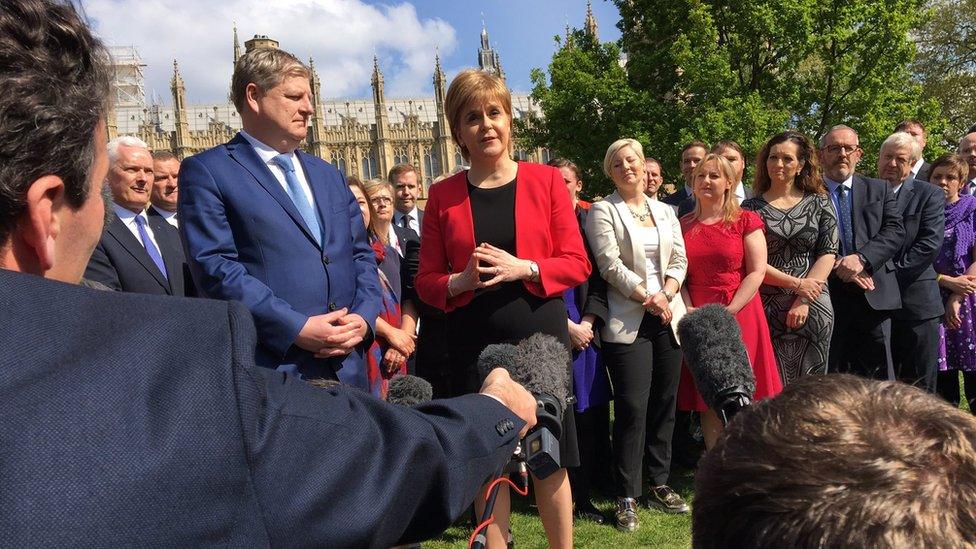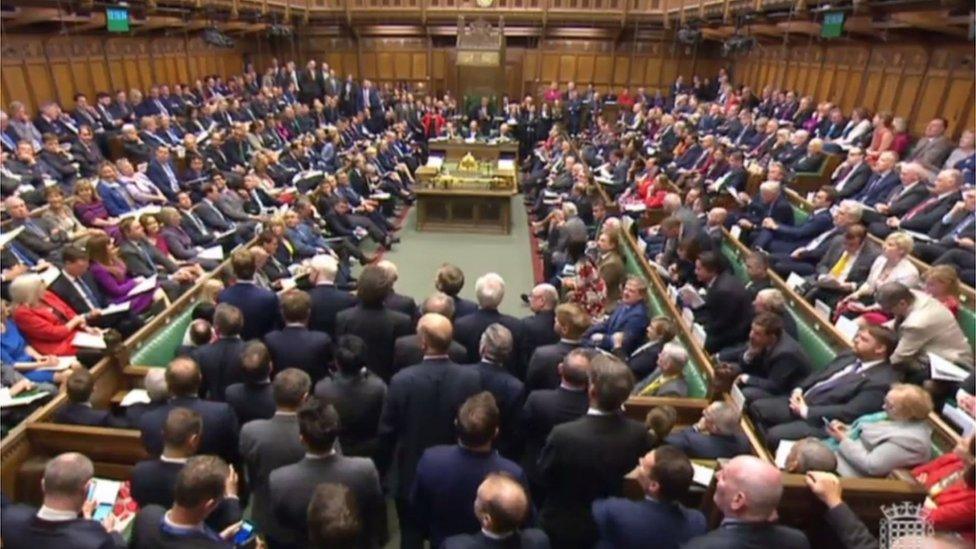General election 2017: SNP MPs abstain in Commons vote
- Published
The moment when the vote is announced for an early general election.
SNP MPs abstained as the House of Commons overwhelmingly backed the prime minister's plan for a snap general election.
MPs voted by 522 to 13 in favour of Theresa May's proposal to hold a general election on 8 June.
Mrs May has argued an election will help the UK make a success of Brexit and provide long-term certainty.
The SNP had said it supports fixed-term parliaments, but would not stand in the way of an early election.
However, Natalie McGarry and Michelle Thomson - who are both sitting as independents after being suspended from the SNP - voted against an election.
Ms McGarry has been charged with fraud offences relating to a potential financial discrepancy in the accounts of two-pro-independence groups, while Mrs Thomson has been reported to prosecutors after a police investigation into allegations of mortgage fraud.
A decision on whether they will be able to put themselves forward as SNP candidates is expected to be made by the party's National Executive Committee on Saturday.
Shortly before the Commons debate on the early election started, Ms McGarry fainted and was treated by ambulance staff before later announcing on Twitter that she was pregnant.
Ahead of the Commons vote, opposition parties highlighted Mrs May's U-turn after she had previously insisted she would not be calling an early election.
But the prime minister told MPs there was a "window of opportunity" to hold a vote before Brexit negotiations begin in earnest in June, and that the country needed "strong leadership" to make a success of the process.

First Minister Nicola Sturgeon held an event with the SNP's MPs outside Westminster ahead of the vote
The prime minister is hoping to significantly boost her current Commons majority of 17 to increase her authority ahead of 18 months of talks which will determine the manner of the UK's exit from the EU.
The vast majority of Labour and Liberal Democrats MPs joined the Conservatives in supporting her call for a snap election.
Nine Labour MPs opposed the snap election as did three independents - including Ms McGarry and Ms Thomson - and the SDLP's Alisdair McDonnell.
The next general election had been due to be held in 2020, but the Fixed Term Parliaments Act allows for one to be held earlier if two-thirds of MPs are in favour.
Mrs May has said she will not take part in any TV leaders' debates, leading to criticism from other party leaders that she is "running scared".
The SNP won 56 of Scotland's 59 seats in the 2015 general election, with the Conservatives, Labour and Liberal Democrats winning one each.
Opinion polls have suggested the SNP continues to enjoy a commanding lead among Scottish voters, with the Conservatives in second place and Labour third.
'Crumble to dust'
First Minister Nicola Sturgeon joined SNP MPs outside parliament ahead of the vote, where she said a victory for her party in the election would see the UK government's arguments against a second independence referendum "crumble to dust".
The Scottish Parliament last month backed Ms Sturgeon's bid to hold a new referendum in 2018 or 2019, but Mrs May has rejected the proposal, repeatedly insisting that "now is not the time".
Ms Sturgeon told journalists: "If the SNP wins this election in Scotland and the Tories don't, then Theresa May's attempt to block our mandate to give the people of Scotland a choice over their own future when the time is right will crumble to dust."
She also insisted that "only the SNP stands between Scotland and an increasingly hard-line Tory government".
The Scottish Conservatives are confident of winning seats from the SNP in the forthcoming election, with leader Ruth Davidson insisting her party is the "best bet" for unionist voters seeking to defeat the SNP.
And she said there was "no way" the SNP was going to win 56 seats this time around.

Only 13 out of 650 MPs voted against an early election
But a Scottish Labour spokesman insisted that: "In constituencies across Scotland, it is only Labour that can stop the SNP."
He added: "If voters want to stop the SNP and its plans for a divisive second independence referendum, their only option is to vote for Labour."
Scottish Liberal Democrat leader Willie Rennie also said his party was "relishing the prospect of this election".
He stated: "It is a chance to change the direction of the whole of the UK. Our optimistic agenda is pro-UK, pro-EU and progressive. We stand with the majority opinion in this country."
And Scottish Greens co-convener Patrick Harvie urged Scottish voters to use the election to "reassert our choice for a fairer and more equal society."